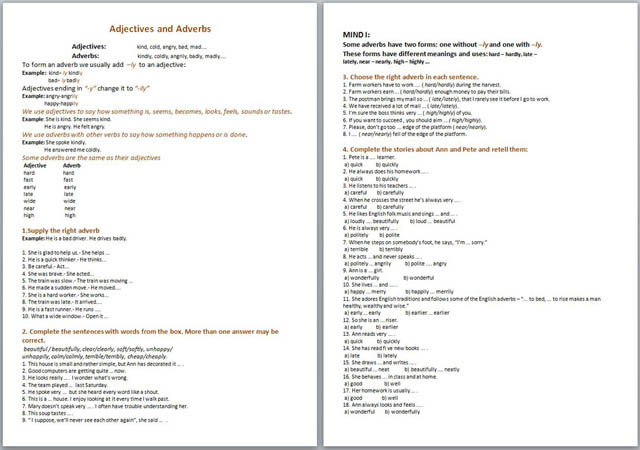Adjectives and Adverbs
Adjectives: kind, cold, angry, bad, mad. . . .
Adverbs: kindly, coldly, angrily, badly, madly. . . .
To form an adverb we usually add –ly to an adjective:
Example: kind+ ly kindly
bad+ ly badly
Adjectives ending in “ - y” change it to “ - ily”
Example: angry - angrily
happy - happily
We use adjectives to say how something is, seems, becomes, looks, feels, sounds or tastes.
Example: She is kind. She seems kind.
He is angry. He felt angry.
We use adverbs with other verbs to say how something happens or is done.
Example: She spoke kindly.
He answered me coldly.
Some adverbs are the same as their adjectives
Adjective Adverb
hard hard
fast fast
early early
late late
wide wide
near near
high high
1. Supply the right adverb
Example: He is a bad driver. He drives badly.
1. She is glad to help us. - She helps. . .
2. He is a quick thinker. - He thinks. . .
3. Be careful. - Act. . .
4. She was brave. - She acted. . .
5. The train was slow. - The train was moving. . .
6. He made a sudden move. - He moved. . . .
7. She is a hard worker. - She works. . .
8. The train was late. - It arrived. . . .
9. He is a fast runner. - He runs. . . .
10. What a wide window. - Open it. . .
2. Complete the sentences with words from the box. More than one answer may be correct.
beautiful / beautifully, clear/clearly, soft/softly, unhappy/
unhappily, calm/calmly, terrible/terribly, cheap/cheaply.
1. This house is small and rather simple, but Ann has decorated it ….
2. Good computers are getting quite … now.
3. He looks really …. I wonder what’s wrong.
4. The team played … last Saturday.
5. He spoke very … but she heard every word like a shout.
6. This is a … house. I enjoy looking at it every time I walk past.
7. Mary doesn’t speak very …. I often have trouble understanding her.
8. This soup tastes ….
9. “ I suppose, we’ll never see each other again”, she said … .

MIND I:
Some adverbs have two forms: one without –ly and one with –ly.
These forms have different meanings and uses: hard – hardly, late –
lately, near – nearly, high – highly. . .
3. Choose the right adverb in each sentence.
1. Farm workers have to work. . . . ( hard/hardly) during the harvest.
2. Farm workers earn. . . ( hard/hardly) enough money to pay their bills.
3. The postman brings my mail so. . . ( late/lately), that I rarely see it before I go to work.
4. We have received a lot of mail. . . ( late/lately).
5. I’m sure the boss thinks very. . . ( high/highly) of you.
6. If you want to succeed , you should aim. . . ( high/highly).
7. Please, don’t go too. . . edge of the platform ( near/nearly).
8. I. . . . ( near/nearly) fell of the edge of the platform.
Весь материал – смотрите документ.

 Получите свидетельство
Получите свидетельство Вход
Вход












 Материал к уроку английского языка "Прилагательные и наречия английского языка" (20.25 КB)
Материал к уроку английского языка "Прилагательные и наречия английского языка" (20.25 КB)
 0
0 1614
1614 153
153 Нравится
0
Нравится
0


